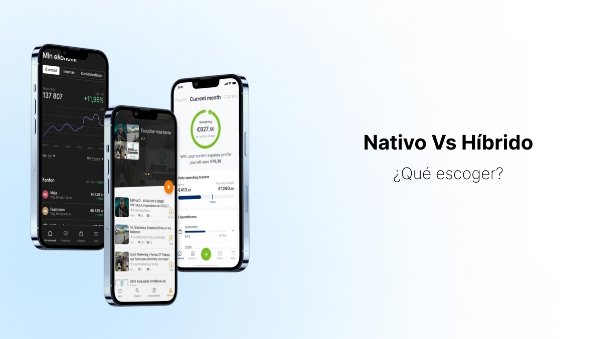Mobile Applications: Hybrid or Native?
18 May 2023 2:52pmBarcelona, May 18, 2023
Currently, the development of mobile applications has become a necessity for any company looking to enhance its online presence and provide an exceptional user experience. When it comes to developing a new mobile application, the dilemma arises between choosing a hybrid or native app. At DIGIO, we understand that this choice can be difficult and can make a significant difference in the success of the application. Therefore, we always recommend to our clients to reflect on their priorities and needs before making a decision.

The dilemma between hybrid vs. native in mobile development
Currently, the development of mobile applications has become a necessity for any company looking to enhance its online presence and provide an exceptional user experience. When it comes to developing a new mobile application, the dilemma arises between choosing a hybrid or native app. At DIGIO, we understand that this choice can be difficult and can make a significant difference in the success of the application. Therefore, we always recommend to our clients to reflect on their priorities and needs before making a decision.
At DIGIO, we have been developing mobile applications for over 15 years, both hybrid and native. In fact, we were pioneers in the development of native apps when Apple and Android launched their operating systems and development environments around 2007. We have since adopted various hybrid development paradigms, allowing us to combine the best of both worlds.
Our experience allows us to speak from a position of knowledge, and in this article, we will delve into the dilemma of developing a hybrid or native application, providing detailed information about the advantages and disadvantages of each approach. We will also analyze the factors that influence the decision and offer suggestions to help our clients make the most appropriate choice.
What is a native app?
A native app is an application designed specifically for a particular mobile operating system, such as iOS or Android. These apps are developed using the official tools and programming languages provided by Apple and Google. This allows for greater integration with the operating system, resulting in better control over the hardware and lower-level development. This feature is particularly useful when the project requires fine-grained control over certain device features, such as GPS, background processes, multimedia playback, etc. Having this level of access to the device is also beneficial for optimizing app performance and improving the user experience.
What is a hybrid app?
In contrast to native apps, hybrid app development frameworks aim to generate executable binaries for devices with different architectures and operating systems from a single source code base.
There are currently multiple technologies with different approaches, each with its own peculiarities that deserve a dedicated article. However, without going into too much detail, we can generalize by saying that these technologies are based on interpreting a common language, typically JavaScript, and generating native code from it. Older frameworks relied on interpreting JavaScript code at runtime or even used an embedded web browser, but in more recent technologies like React Native, much of the work is done at compile-time, resulting in an essentially native application that runs on the device. In essence, what characterizes all these technologies is the use of an unofficial SDK developed by a third party, which allows us to generate code that can run on multiple platforms.
Advantages of Native Apps
-
Performance: Native apps have direct access to the device's hardware and operating system, resulting in optimized performance and responsiveness. They can take full advantage of the device's capabilities, including graphics processing, camera, GPS, and more.
-
User Experience: Native apps provide a seamless and familiar user experience because they follow the design guidelines and user interface components of the specific platform. They offer native interactions, animations, and navigation patterns, which can enhance user engagement.
-
Access to Device Features: Native apps have better access to device features, such as push notifications, contacts, calendar, camera, and other sensors. This allows for more advanced functionality and integration with other apps installed on the device.
- App Store Optimization: Native apps can leverage the specific features and optimization techniques provided by the app stores. This includes utilizing app indexing, in-app purchases, app reviews, and other app store-specific features to improve discoverability and user acquisition.
Advantages of Hybrid Apps
-
Cross-Platform Compatibility: Hybrid apps can run on multiple platforms using a single codebase, which significantly reduces development time and costs. This is particularly beneficial for businesses targeting a wide range of devices and operating systems.
-
Faster Development: With hybrid app development, developers can write code once and deploy it on multiple platforms. This results in faster development cycles and quicker time-to-market compared to developing separate native apps for each platform.
-
Code Reusability: Hybrid apps allow for code reusability, as a significant portion of the codebase can be shared across platforms. This simplifies maintenance and updates, as changes can be applied universally without the need for separate codebases.
- Easier Updates: Hybrid apps can be updated seamlessly, as changes made to the codebase can be pushed to all platforms simultaneously. This ensures consistent user experiences and reduces the dependency on users to update their apps manually.
Factors Influencing the Choice
When deciding between hybrid and native app development, several factors should be considered:
-
App Complexity: The complexity of the app and its required features can influence the choice. Native development may be preferred for apps that require fine-grained control over hardware or have demanding performance requirements. Hybrid development is suitable for simpler apps with basic functionalities.
-
Target Platforms: Consider the platforms you want to target. If you aim to reach users across different operating systems, hybrid development provides a cost-effective solution. However, if you prioritize delivering the best user experience on a specific platform, native development may be more suitable.
-
Development Resources: Assess your development team's expertise and resources. Native app development typically requires platform-specific skills (e.g., Swift for iOS, Kotlin for Android), while hybrid app development often relies on web technologies (e.g., JavaScript, HTML, CSS). Consider the availability and proficiency of your development team in these technologies.
- Timeline and Budget: Time and budget constraints play a crucial role in the decision-making process. Hybrid development can save time and costs due to code reuse and faster development cycles. Native development may require more time and resources, especially when targeting multiple platforms.
Conclusion
The choice between hybrid and native app development depends on several factors, including performance requirements, user experience goals, target platforms, development resources, and project constraints. Both approaches have their advantages and limitations, and the decision should be based on careful consideration of these factors.
At DIGIO, we have extensive experience in both hybrid and native app development. Our team can help you analyze your requirements and guide you towards the most suitable approach for your mobile application. Contact us today to discuss your project and explore the best development strategy.
About DIGIO: DIGIO is a leading software development company specializing in mobile app development, web development, and digital transformation solutions. With a team of skilled professionals and a customer-centric approach, we deliver high-quality software products that drive business growth and innovation. Visit our website at www.digio.com to learn more about our services and expertise.




